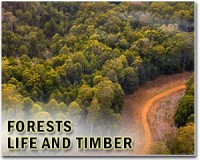| . |  |
. |
Brasilia (AFP) May 25, 2011 Brazil's powerful agricultural sector has scored a major victory, with the approval by the lower house of Congress of a reform that would open up some protected forests to cropland and ranchers. The bill, which now goes to the Senate, was initially intended as a measure to rein in unfettered logging, and increase protections of Brazil's forested areas, which play an important role in reducing greenhouse gases. But farm-based economic interests prevailed against environmentalists in reshaping the bill to ease restrictions that have been in place since 1965 and are credited with curbing deforestation. "The Chamber of Deputies (on Tuesday) turned what was a forest protection law into something that will encourage deforestation and the uncontrolled advance of farming and ranching," the NGO Greenpeace charged in a statement. Environmentalists, scientists and ten former environment ministers fought to the bitter end to stop the bill, which now goes onto the Senate. The development was seen as a first setback for President Dilma Rousseff who enjoys majority support in Congress but was unable to keep her party united as powerful rural lobbies managed to divide lawmakers. Rousseff's Environment Minister Izabella Teixeira has warned that the president could veto points in the bill that might encourage deforestation. But National Farm Federation chief Katia Abreu said, "Brazil's farm and ranch interests are celebrating the step forward." Brazil's Forest Conservation Law dates back to 1965; it limits the use of woodlands for agricultural purposes, requiring owners to keep a certain percentage of their land in its natural state. In the sprawling Amazon River basin region, the existing law requires that as much as 80 percent be kept as woodland. But the new law would allow huge areas to be farmed if they were illegally logged before July 2008; and it would allow farming along environmentally sensitive riverbanks. "This is an amnesty that sends the message that environmental crimes are not punished. And that will foster more deforestation," argued Paulo Adario of Greenpeace. With international crop prices high and in many cases rising, farmers are keen to cash in as much as possible. Brazil is a major producer of soybeans and beef. More than 60 percent of Brazil's 8.5 million square kilometers (3.3 million square miles) are jungles and forests, but two thirds of it is either privately owned or its ownership is undefined.
Share This Article With Planet Earth
Related Links Forestry News - Global and Local News, Science and Application
 Environmentalist husband, wife shot dead in Brazil
Environmentalist husband, wife shot dead in BrazilRio De Janeiro (AFP) May 25, 2011 A husband and wife team of environmentalists have been killed by gunmen in Brazil's northern Amazon state of Para, one of the most restive regions in the country due to land disputes, officials said Wednesday. Brazilian President, Dilma Rousseff ordered an immediate federal investigation to find those responsible for the double murder, in a wild region where owners of large estates are alleg ... read more |
|
| The content herein, unless otherwise known to be public domain, are Copyright 1995-2010 - SpaceDaily. AFP and UPI Wire Stories are copyright Agence France-Presse and United Press International. ESA Portal Reports are copyright European Space Agency. All NASA sourced material is public domain. Additional copyrights may apply in whole or part to other bona fide parties. Advertising does not imply endorsement,agreement or approval of any opinions, statements or information provided by SpaceDaily on any Web page published or hosted by SpaceDaily. Privacy Statement |